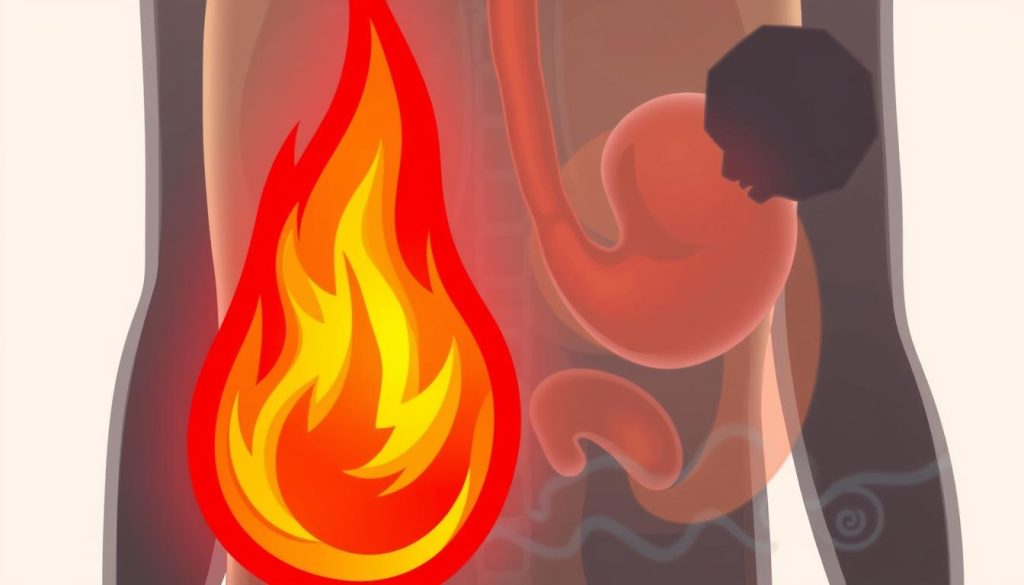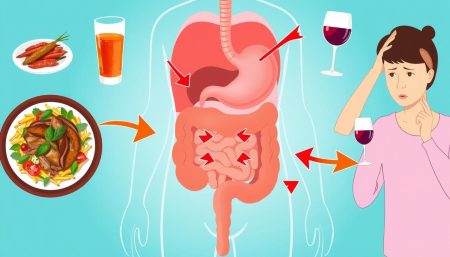Knowing the signs of acid reflux is key to feeling better. This common issue can really disrupt your day. We aim to help you understand the acid reflux symptoms you might face.
These symptoms include heartburn, chest pain, and regurgitation. Ignoring these signs can harm your health. For those looking to improve their well-being, these health tips can help manage acid reflux.
Key Takeaways
- Understanding acid reflux symptoms can lead to better health outcomes.
- Heartburn is a hallmark sign and can seriously affect quality of life.
- Proactive management strategies are pivotal in mitigating discomfort.
- Recognizing when to seek medical advice is crucial for maintaining health.
- Lifestyle modifications can be a cornerstone in managing acid reflux.
- Educational resources provide valuable support for those affected.
Understanding Acid Reflux and Its Impact on Health
Acid reflux is a common but uncomfortable condition that affects many health areas. We will look into what it is, its effects, how common it is, and who is at risk. Our goal is to give you the knowledge you need to take care of your health.
Defining Acid Reflux
Acid reflux, also known as gastroesophageal reflux disease (GERD), is when stomach acid flows back into the esophagus. This can cause a burning feeling in the chest and bring up food or sour liquid. Knowing what acid reflux is helps you find the right treatment.
Prevalence and Risk Factors
Acid reflux affects a lot of people worldwide, showing its big health impact. Certain acid reflux risk factors make it more likely to happen. These include being overweight, what you eat, smoking, and changes like pregnancy.
- Being overweight puts more pressure on your stomach, leading to acid reflux.
- Eating spicy foods, caffeine, and alcohol can make symptoms worse.
- Smoking weakens the muscle that keeps acid in the stomach.
- Pregnancy can increase acid reflux due to hormonal changes and physical changes in the body.
Knowing these risk factors is key to managing acid reflux and its effects on your health. Learning about these factors is a big step towards better health.
Recognizing the Primary Symptom: Heartburn
Heartburn is a burning sensation in the chest. It’s the primary symptom of acid reflux. This feeling usually starts in the sternum and can move up to the throat. It’s important to notice this symptom early to avoid bigger health problems.

The Burning Sensation Explained
Heartburn happens when stomach acid flows back into the esophagus. This creates a burning feeling. It happens when the esophageal sphincter relaxes or weakens, letting stomach acids reach the esophagus lining. Knowing this helps you spot symptoms and act fast.
When to Be Concerned About Heartburn
Having heartburn now and then is normal and usually not a big worry. But if it happens a lot, it might mean you have GERD. If you’re worried, you should talk to a doctor. Signs that mean you need to see a doctor right away include severe chest pain, trouble swallowing, or constant vomiting.
| Frequency of Heartburn | Potential Condition | Recommended Action |
|---|---|---|
| Occasional | Normal Acid Reflux | Monitor and Manage Diet |
| Frequent | Possible GERD | Consult Healthcare Provider |
| Persistent with other symptoms | High risk of Severe GERD or Other Complications | Seek Immediate Medical Attention |
Seeing heartburn as a primary symptom of acid reflux is key. Knowing when it’s more than just a nuisance is important. Taking care of it early and getting help when needed can stop bigger problems and make life better.
What Is the Symptoms for Acid Reflux
It’s important to know the acid reflux signs if you’re dealing with this issue. Acid reflux, or gastroesophageal reflux, has symptoms beyond just heartburn. We’ll explore these symptoms to help you understand how acid reflux can impact your daily life.
- Sour Taste in Mouth: A classic symptom where an unpleasant sour taste emerges, often due to regurgitated stomach acid.
- Difficulty Swallowing: Known as dysphagia, this occurs when stomach acid damages the esophagus, leading to esophageal discomfort.
- Nausea: An unsettling symptom that can sometimes accompany severe cases of acid reflux.
- Cough and Hoarseness: Both symptoms can be explained by stomach acid’s ascent through the esophagus into the throat, irritating the lining.
Each symptom alone might seem like other health issues. But together, they paint a picture of gastroesophageal reflux. Spotting these acid reflux signs early can help manage the condition better. This can also lower the risk of serious problems like esophageal cancer.
If you’re experiencing any of these symptoms, see a healthcare provider. They can give you a proper diagnosis and suggest the right treatment.
Experiencing Chest Pain: When Is It More Than Just Discomfort?
Chest pain can be scary and confusing. It often mixes up acid reflux symptoms with serious heart problems. Knowing the difference is key for the right treatment.
Differentiating Between Acid Reflux and Heart Issues
Acid reflux pain feels like burning behind the breastbone, especially after eating or lying down. Heart pain, on the other hand, feels like pressure or squeezing. It might spread to arms or jaw and is usually more severe.
Identifying Acid Reflux-Related Chest Pain
Timing and triggers help spot acid reflux chest pain. Unlike heart pain, which can happen anytime, acid reflux pain often comes after eating. It can get better with antacids. Lifestyle and diet are big in managing these symptoms.
| Symptom | Acid Reflux Chest Pain | Cardiac Chest Pain |
|---|---|---|
| Characteristic | Burning sensation | Pressure or squeezing |
| Timing | Post-meal, lying down | Variable, often with activity |
| Triggers | Food, stress | Physical exertion, emotional stress |
| Relief | Antacids, standing up | Medication, rest |

It’s important to know the difference between acid reflux and heart pain. This helps avoid worrying about heart problems when it’s just acid reflux. If symptoms don’t match acid reflux, see a doctor to check for serious issues.
Regurgitation: Recognizing Reflux in Action
Acid regurgitation is a key sign of reflux, making people more aware of their digestive health. It’s often confused with simple indigestion. But it’s important to understand its effects on the esophagus and overall health.
Spotting acid regurgitation means noticing when stomach contents move back up into the throat or mouth. It’s different from vomiting because it’s easy and doesn’t make you feel sick. The taste can be sour or bitter, showing acid is present.
It’s key to know the difference between acid regurgitation and other digestive problems. This helps manage digestive health better. Here’s a comparison of common conditions with acid regurgitation:
| Condition | Primary Symptom | Associated Sensation |
|---|---|---|
| Acid Regurgitation | Backflow of stomach contents | Sour/Bitter taste |
| Vomiting | Forceful expulsion of stomach contents | Nausea |
| Heartburn | Burning in the chest | Heating sensation |
| Dyspepsia | Bloating and discomfort | Fullness |
Knowing about reflux symptoms like acid regurgitation helps catch problems early. This can protect the esophagus and improve life quality. If you’re experiencing regurgitation, see a doctor to talk about treatment and how to better your digestive health.
Dealing With the Sour Taste in Your Mouth
Many people with acid reflux have a sour taste in their mouth. This taste can make everyday activities less enjoyable. We will explore why this happens and how to manage it.
Understanding the Causes
The main reason for a sour mouth with acid reflux is stomach acid flowing back up. This can hurt your mouth and teeth. Foods, smoking, and alcohol can make it worse by raising stomach acid levels.
Managing the Unpleasant Flavor
To lessen the sour taste, you can make some changes. These include:
- Avoid foods that trigger acid reflux.
- Eat smaller meals more often to help digestion.
- Stay upright for 30 minutes after eating.
- Stop smoking and drink less alcohol.
Also, keeping your mouth clean is important. Brushing and using mouthwash can help get rid of the sour taste and protect your teeth.

The Challenges of Difficulty Swallowing
Dysphagia, or trouble swallowing, is a big problem for esophageal health and daily life. It makes eating hard and shows how important gut health is for overall well-being. Dysphagia can cause a lot of pain and might affect how well you eat, making health issues worse.
Dysphagia often happens when the esophagus is too long exposed to stomach acid. This can cause inflammation or damage. It feels like food is stuck in your throat or chest, a common sign of swallowing difficulties. If you have these symptoms, you should see a doctor right away. They could mean a serious problem with your esophagus.
| Signs of Dysphagia | Management Strategies |
|---|---|
| Persistent throat soreness | Gentle throat exercises |
| Feeling of food stuck in the throat | Diet modification |
| Pain while swallowing | Over-the-counter antacids |
| Chronic cough | Drinking more fluids |
| Unintended weight loss | Consultation with a dietician |
Fixing dysphagia needs a team effort. It includes changing your lifestyle, diet, and sometimes medical help. To keep your esophageal health good, avoid foods that make acid reflux worse. Eat smaller meals more often and sleep with your head up. Doctors might give you medicine to lower stomach acid or do surgery to stretch your esophagus. Always talk to a doctor about these options.
Knowing how acid reflux and swallowing troubles like dysphagia are connected helps manage them better. It also makes life better for those dealing with these issues. By taking care of your esophagus, you can lessen the effects of acid reflux symptoms, including swallowing problems.
Nausea as a Symptom of Acid Reflux
Feeling nauseous can really mess up your day and how you feel. If it’s because of acid reflux, knowing why and how to fix it is key. This part talks about the connection between acid reflux nausea and how it affects your life. It also gives tips on managing nausea well.
When Acid Reflux Leads to Nausea
Acid reflux happens when stomach acid goes back up the esophagus. This causes pain and gastrointestinal symptoms. Nausea is a big sign of bad acid reflux. Spotting this early can help stop it from getting worse.
Nausea Management and Relief Strategies
To handle nausea from acid reflux, you need to change your lifestyle and use medicine. Eating less spicy and fatty foods helps. Also, antacids and certain medicines can help with reflux relief and managing nausea.
- Stay upright after eating to stop acid from flowing back.
- Eat smaller meals more often to make digestion easier.
- Don’t eat before bed to let your body digest food while you sleep.
| Strategy | Brief Description | Effectiveness |
|---|---|---|
| Dietary Adjustments | Limiting foods like caffeine, chocolate, and acidic fruits. | High |
| Medication | Using antacids or acid blockers as a doctor suggests. | Medium to High |
| Lifestyle Changes | Adding regular exercise and stress-reducing activities. | Medium |
Using these methods can really help reduce acid reflux nausea discomfort. It’s important to tackle the gastrointestinal symptoms at their source for lasting reflux relief.
The Link Between Acid Reflux and Cough
Acid reflux is a common health problem that causes uncomfortable respiratory symptoms. The reflux cough is a big concern. It can really affect your life, so it’s important to know about it and find good acid reflux treatment.
How Acid Reflux Can Induce Coughing
When stomach acids go back up into the esophagus, they can cause heartburn. They can also reach the throat and irritate it, making you cough. This reflux cough is often worse at night or in the early morning. It makes it hard to sleep well. Knowing this can help those with chronic cough find relief through acid reflux treatment.
Treating Reflux-Induced Cough
To manage a reflux cough, you need both medical and lifestyle changes. Here’s a table with treatments that can help with respiratory symptoms and give relief:
| Acid Reflux Treatment | Brief Description | Impact on Reflux Cough |
|---|---|---|
| Medications (Antacids, H2 Blockers, PPIs) | Reduce the production of stomach acid, decreasing irritation. | Can significantly reduce the frequency and intensity of cough. |
| Diet Changes | Avoid trigger foods like spicy dishes, chocolate, caffeine, and alcohol. | Helps prevent episodes of acid reflux, thus reducing cough occurrences. |
| Elevating the Head During Sleep | Prevents acid from traveling back up the esophagus. | Decreases nighttime reflux cough, improving sleep quality. |
| Quit Smoking and Reduce Alcohol Consumption | Minimizes throat irritation and acid reflux. | Leads to overall improvement in respiratory function and cough reduction. |
Understanding the link between acid reflux and respiratory symptoms, like reflux cough, helps you take action. Always talk to a healthcare professional about acid reflux treatment for chronic health issues.
Hoarseness: A Less Known Symptom of Acid Reflux
Many know about heartburn and nausea from acid reflux. But acid reflux hoarseness is often missed. It can hurt throat health and how we speak.
Understanding Why Acid Reflux Causes Hoarseness
Stomach acid going up the esophagus can irritate the throat and vocal cords. This can make your voice sound scratchy or even stop working. Knowing this can help if your voice changes suddenly.
Protecting Your Voice from Acid Reflux
To keep your voice safe from acid reflux, take these steps:
- Avoid foods that make acid reflux worse, like spicy foods, chocolate, and citrus fruits.
- Eat smaller meals more often to ease digestion.
- Don’t lie down right after eating to stop acid from reaching your throat.
| Protective Measure | Improvement in Voice Symptoms | Throat Health Enhancement |
|---|---|---|
| Diet Adjustment | Significant | Moderate |
| Medication | Moderate | Significant |
| Meal Timing | Mild | Moderate |
Managing acid reflux hoarseness is key for good throat health and life quality.
Conclusion
We’ve explored acid reflux and its effects on our health. We’ve seen how it can cause heartburn and discomfort. Recognizing these symptoms is key to taking care of ourselves.
By understanding these signs, we can start managing acid reflux. This improves our daily lives and our health in the long run.
Many people live with acid reflux, but with the right knowledge, we can handle it. We learn to tell normal symptoms from the ones that need attention. This helps protect our esophagus from stomach acid.
Every story of living with acid reflux shows our strength and resilience. It encourages us to support each other in our health journeys.
Managing health is a journey we can take together. We can make dietary changes, adjust our lifestyle, or seek medical help. Living with acid reflux can be manageable with the right approach.
We aim for a life where discomfort is met with empathy and strength. Navigating health challenges shows our ability to adapt and grow.
FAQ
Q: What are common signs of acid reflux?
A: Signs of acid reflux include heartburn and a burning sensation in the chest or throat. You might also feel like food or sour liquid is coming back up. Difficulty swallowing and chest pain are other symptoms. Some people may also have a chronic cough, hoarseness, or a sour taste in their mouths.
Q: How does acid reflux impact overall health?
A: Acid reflux can lead to serious conditions like GERD, esophagitis, and even esophageal cancer if not treated. Recognizing symptoms early and getting proper treatment is key for your health and quality of life.
Q: When should I be concerned about heartburn?
A: Heartburn now and then is normal. But, if it happens more than twice a week, or if you have trouble swallowing, see a doctor. Also, if your symptoms don’t get better with over-the-counter treatments, it’s time to seek medical help.
Q: How can I differentiate between acid reflux and heart issues when experiencing chest pain?
A: Acid reflux chest pain often happens after eating and may feel like a sour taste or trouble swallowing. Heart issues might include shortness of breath, nausea, or arm pain. If you’re unsure, get medical help right away, as it could be a heart attack.
Q: What causes the sour taste in my mouth?
A: A sour taste comes from stomach acid and food coming up into your mouth. This is a sign of acid reflux or GERD.
Q: What should I do if I have difficulty swallowing?
A: Difficulty swallowing, or dysphagia, is serious. Acid reflux can damage your esophagus, causing this problem. Try changing your diet, taking medication, or even surgery to fix it.
Q: How is nausea linked to acid reflux?
A: Nausea happens when stomach acid comes up into your esophagus and irritates your stomach lining. If you get nauseous often, talk to a doctor about what to do.
Q: Can acid reflux cause a chronic cough?
A: Yes, acid reflux can irritate your respiratory tract, causing a dry cough. If you cough a lot without a reason, acid reflux might be the cause.
Q: Why does acid reflux cause hoarseness?
A: Stomach acid can irritate your throat and vocal cords, causing hoarseness. To protect your voice, manage your acid reflux through lifestyle changes and medication.
















